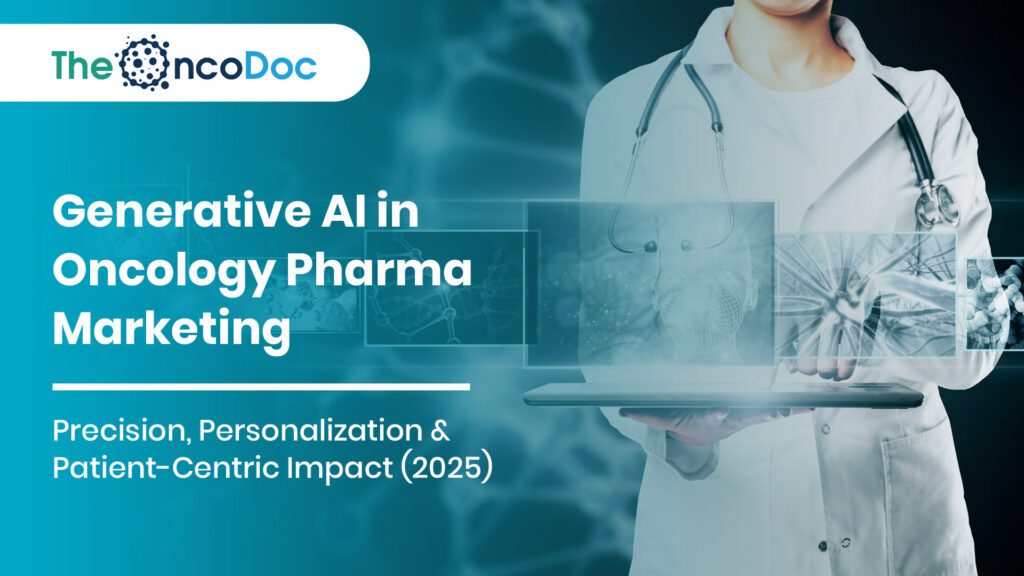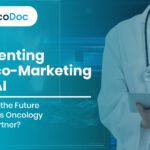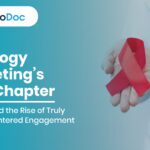Introduction: The Fusion of AI, Oncology, and Marketing
Oncology pharma marketing has entered a turning point where data-driven intelligence meets emotional storytelling. As cancer incidence continues to rise, the need for precision communication, empathetic engagement, and hyper-personalized awareness campaigns has never been greater. Artificial intelligence, especially generative AI, is transforming how pharma companies educate patients, empower caregivers, and support oncologists.
Unlike the past, where campaigns revolved around one-size-fits-all drug promotions, today’s oncology marketing ecosystem thrives on personalized content, predictive insights, and trust-building strategies powered by AI. The future is not just about selling therapies, it’s about becoming partners in a patient’s cancer journey.
This article explores new and trending strategies in oncology pharma marketing for 2025, focusing on how generative AI is revolutionizing content, campaigns, and community impact.
1. Generative AI as the New Storyteller
Generative AI tools are reshaping how patients receive cancer-related information. Instead of generic brochures, patients now get AI-generated narratives tailored to their health conditions, emotional state, and cultural context.
- Example: A breast cancer patient in Mumbai may receive Hindi-language AI-curated explainer videos with empathetic storytelling.
- Families of leukemia patients might get simplified AI-generated infographics breaking down bone marrow transplants step by step.
This storytelling isn’t just informative, it is empathetic, culturally sensitive, and emotionally supportive.
2. Personalized Patient Education at Scale
One of the biggest breakthroughs of generative AI is its ability to simplify complex oncology treatments for patients and caregivers.
- AI creates simplified versions of clinical trial brochures for easier comprehension.
- It tailors disease awareness content to age, literacy, and regional language.
- Dynamic FAQs generated by AI reduce confusion and anxiety.
This ensures that patients understand treatment options without feeling overwhelmed.
3. Empathy-Driven Messaging with AI
Cancer communication often risks sounding clinical and detached. Generative AI is being trained on empathetic language models, ensuring content is:
- Supportive rather than alarming.
- Emotionally intelligent, reducing fear.
- Culturally adapted, resonating across different geographies.
AI ensures that every touchpoint, whether a chatbot, email, or WhatsApp message, feels like a human conversation with compassion.
4. AI-Powered Patient Journey Mapping
AI now creates personalized patient funnels that map each step, from suspicion of symptoms to survivorship. Pharma marketers use these insights to design:
- Awareness campaigns that trigger early screenings.
- Navigation tools guiding patients to oncologists or cancer centers.
- Survivorship programs supporting long-term wellness.
This transforms marketing into a lifelong partnership with patients.
5. Chatbots as Digital Cancer Companions
Oncology chatbots powered by AI are no longer just FAQ tools. They serve as round-the-clock cancer coaches by:
- Helping patients book screenings.
- Answering questions about side effects.
- Guiding caregivers with nutrition and mental health support.
Chatbots act as direct-to-consumer pharma touchpoints, blending trust with accessibility.
6. AI in Clinical Trial Recruitment
Recruitment for oncology trials is notoriously difficult. AI-driven personalization is solving this by:
- Identifying eligible patients faster.
- Generating simplified trial content to increase participation.
- Using localized outreach campaigns powered by generative AI.
This reduces trial dropouts and accelerates innovation.
7. Hyperlocal Cancer Campaigns
AI-powered geo-targeting allows pharma brands to deliver content relevant to a region’s most prevalent cancer types.
- Example: Oral cancer prevention content in rural India vs. breast cancer awareness in urban metros.
- Localized AI-driven ads in vernacular languages.
This hyperlocal precision makes campaigns more effective.
8. AI-Driven GP Education
General practitioners (GPs) are often the first point of cancer detection, yet many lack oncology training. Generative AI is helping by:
- Creating micro-learning modules in WhatsApp or mobile apps.
- Delivering real-time alerts when AI detects cancer-related search spikes in a region.
- Providing AI-curated summaries of new cancer guidelines.
This ensures faster referrals and earlier diagnosis.
9. Predictive Oncology Campaigns
Generative AI is transforming oncology marketing by enabling early prediction of cancer trends. By analyzing search data, social media discussions, and regional health queries, such as spikes in terms like “persistent cough” or “lump in neck”, AI identifies potential cancer hotspots. Pharma marketers can then launch real-time micro-campaigns, ensuring timely awareness, screening drives, and GP education in those regions. This predictive approach shifts marketing from reactive messaging after diagnosis to proactive intervention before the disease progresses, ultimately saving lives while positioning pharma brands as responsible health partners driving early detection and preventive care.
10. Gamification in Patient Awareness
AI-powered gamification is emerging as a powerful trend in oncology pharma marketing, making awareness and prevention both engaging and impactful. Instead of traditional campaigns, patients now interact with game-like experiences that encourage proactive participation in their health journey. These include:
- Cancer risk quizzes that provide instant personalized feedback and lifestyle tips.
- Community-based screening challenges where families, schools, or workplaces compete in early detection drives.
- Achievement badges and digital rewards that patients can share on social media, inspiring peers to take action.
By turning cancer awareness into an interactive experience, gamification reduces stigma, makes education memorable, and motivates people to act early. Studies suggest that incorporating gamification into oncology campaigns can boost screening participation rates by 25–30%, while also increasing long-term engagement with preventive healthcare initiatives. This approach combines fun with responsibility, transforming awareness into measurable health outcomes.
11. Wearables + AI in Cancer Prevention
The integration of smart wearables with AI is redefining cancer prevention strategies by enabling continuous health monitoring and early alerts. Devices such as smartwatches and fitness trackers now collect vital data on sleep patterns, physical activity, heart rate, and even subtle weight fluctuations, changes that may serve as early warning signs of cancer.
- AI analyzes these data points in real time, identifying anomalies that could indicate risk factors.
- Personalized oncology notifications are then delivered to users, nudging them to schedule screenings or consult a doctor.
- Pharma apps synchronize with wearable data, allowing marketers to design highly targeted awareness campaigns that address specific risk groups.
This AI-wearable synergy shifts cancer marketing from general education to precision prevention, empowering patients with actionable insights while fostering long-term engagement. Ultimately, it helps bridge the gap between lifestyle data and proactive oncology care, improving early detection rates.
12. Emotional Analytics in Campaign Design
AI-driven emotional analytics is becoming vital in oncology marketing, helping brands understand how patients emotionally respond to campaigns. By scanning comments, reviews, and online discussions, AI can detect signals of fear, hope, confusion, or trust within patient communities. Marketers then use these insights to:
- Modify campaign tone to be more supportive and empathetic.
- Replace data-heavy content with survivor-driven storytelling that inspires confidence.
- Maintain emotional balance, ensuring messages educate without causing anxiety.
This approach makes campaigns more human-centered, fostering deeper trust and stronger engagement with oncology audiences.
13. Digital Twins for Personalized Oncology Content
Advances in AI are enabling the creation of digital twins, virtual replicas of patients that simulate their unique health journeys. These models provide pharma marketers with powerful tools to design deeply personalized content and support materials. Digital twins can:
- Predict potential side effects, helping patients prepare in advance.
- Customize therapy explanations, making complex treatments easier to understand.
- Deliver patient-specific educational content, reducing uncertainty and anxiety.
By mirroring real-world health scenarios, digital twins transform oncology marketing into a precision-driven, personalized experience, fostering greater patient trust and treatment adherence.
14. AR/VR with Generative AI for Patients
AI-driven VR experiences let patients visualize how therapies work inside their bodies.
- Example: Immune cells targeting tumors shown via VR simulation.
This reduces anxiety, improves acceptance, and builds trust.
15. Survivor-Led AI Campaigns
Generative AI curates survivor stories, turning them into regionalized digital campaigns that resonate deeply. These survivor-led narratives drive:
- 40% higher engagement rates.
- More referrals for screenings.
16. Voice + AI in Rural Oncology Awareness
AI-powered voice campaigns are reaching low-literacy populations through IVR and smart speakers. AI reacts with personalized cancer awareness advice when patients ask inquiries in their native tongue.
17. AI for Post-Treatment Engagement
Beyond treatment, pharma brands now use AI to:
- Provide nutrition and mental health plans.
- Track recovery progress through apps.
- Offer long-term survivorship support.
This builds trust beyond active treatment.
18. AI for Caregiver Support
Generative AI doesn’t just help patients, it supports caregivers by generating:
- Guidance for managing side effects.
- Stress-relief content.
- Daily schedules for treatment routines.
19. Social Listening with AI to Counter Myths
Generative AI scans millions of online posts to detect and counter misinformation (e.g., “herbal cures for cancer”). It then generates:
- Fact-checking campaigns with oncologists.
- Short AI-driven videos debunking myths.
20. Partnerships + AI-Backed Outreach
AI is helping pharma align better with NGOs and government health campaigns by:
- Predicting which regions need urgent attention.
- Generating resource-efficient co-branded materials.
This strengthens pharma’s credibility and public trust.
21. Generative AI for Multilingual Cancer Communication
One of the biggest barriers in oncology marketing is language diversity. Cancer information is often available only in English, leaving millions of patients confused. Generative AI is now being used to:
- Translate cancer education content into 50+ regional languages instantly.
- Adapt tone and style for cultural sensitivity (e.g., softer metaphors in Asian contexts vs. fact-driven clarity in Western settings).
- Create voice-based explainer audios for low-literacy patients.
For instance, a lung cancer awareness chatbot in India can switch between Hindi, Tamil, and Bengali while maintaining empathy-driven tone. This removes communication barriers and makes oncology marketing more inclusive.
22. AI + Blockchain for Trust in Oncology Campaigns
Trust is one of the most fragile aspects of cancer communication. Patients often question the authenticity of digital campaigns. By merging AI with blockchain, pharma marketers are:
- Ensuring tamper-proof medical information, verified by oncologists.
- Creating AI-powered QR codes on brochures and ads, which lead patients to blockchain-verified content libraries.
- Using blockchain-backed clinical trial recruitment so patients trust that their data is safe.
This combination transforms marketing into a trust-first ecosystem, reducing skepticism and misinformation.
23. Real-Time Emotion-Adaptive Campaigns
Generative AI now powers campaigns that adapt in real time to patient emotions. Through sentiment analysis, pharma marketers can:
- Detect whether a patient’s social media comments show fear, hope, or confusion.
- Instantly adjust campaign messaging, switching from statistics to survivor-led emotional storytelling when anxiety levels are high.
- Personalize visual campaigns (e.g., softer color schemes for calming content vs. bold visuals for motivating screenings).
Such adaptive marketing ensures that patients feel understood and supported at every moment, not overwhelmed.
24. AI-Generated Metaverse Support Communities
The metaverse is entering oncology pharma marketing as a tool for community building. Immersion environments and AI-generated avatars enable patients and caregivers to:
· Attend virtual cancer awareness fairs sponsored by pharma companies.
- Interact with AI-driven oncologist avatars for basic FAQs.
- Join survivor circles in VR environments, breaking stigma and isolation.
These communities provide safe, anonymous, and supportive spaces while giving pharma marketers real-time insights into patient needs.
25. Precision Oncology Marketing with Digital Biomarkers
The integration of digital biomarkers from wearables, EHRs, and mobile apps with generative AI is growing. This allows pharma companies to:
- Predict who might need screenings earlier, based on subtle health changes.
- Send AI-personalized reminders tied to biomarkers (e.g., alerting a patient with abnormal sleep and weight loss to book a screening).
- Generate dynamic, data-informed campaigns that reflect real patient health trends.
This precision ensures that oncology marketing is not just broad outreach but intelligent, individualized guidance rooted in science.
Conclusion: AI + Oncology Marketing Beyond 2025
With these developments, marketing for cancer pharmaceuticals is no longer limited to pamphlets and awareness campaigns. It has evolved into a dynamic ecosystem powered by AI, where every patient touchpoint is personalized, verified, and emotionally resonant.
Generative AI doesn’t just create content, it builds trust, empathy, and community connections. From multilingual outreach to blockchain-backed authenticity, from emotion-adaptive storytelling to metaverse communities, pharma brands are reshaping how cancer care is communicated worldwide.
The future belongs to AI-driven oncology marketing models that integrate precision medicine, predictive analytics, and compassionate communication. Success will be defined not by reach or clicks but by how many lives are extended, how many fears are reduced, and how many survivors feel supported.
The Oncodoc team is a group of passionate healthcare and marketing professionals dedicated to delivering accurate, engaging, and impactful content. With expertise across medical research, digital strategy, and clinical communication, the team focuses on empowering healthcare professionals and patients alike. Through evidence-based insights and innovative storytelling, Hidoc aims to bridge the gap between medicine and digital engagement, promoting wellness and informed decision-making.



